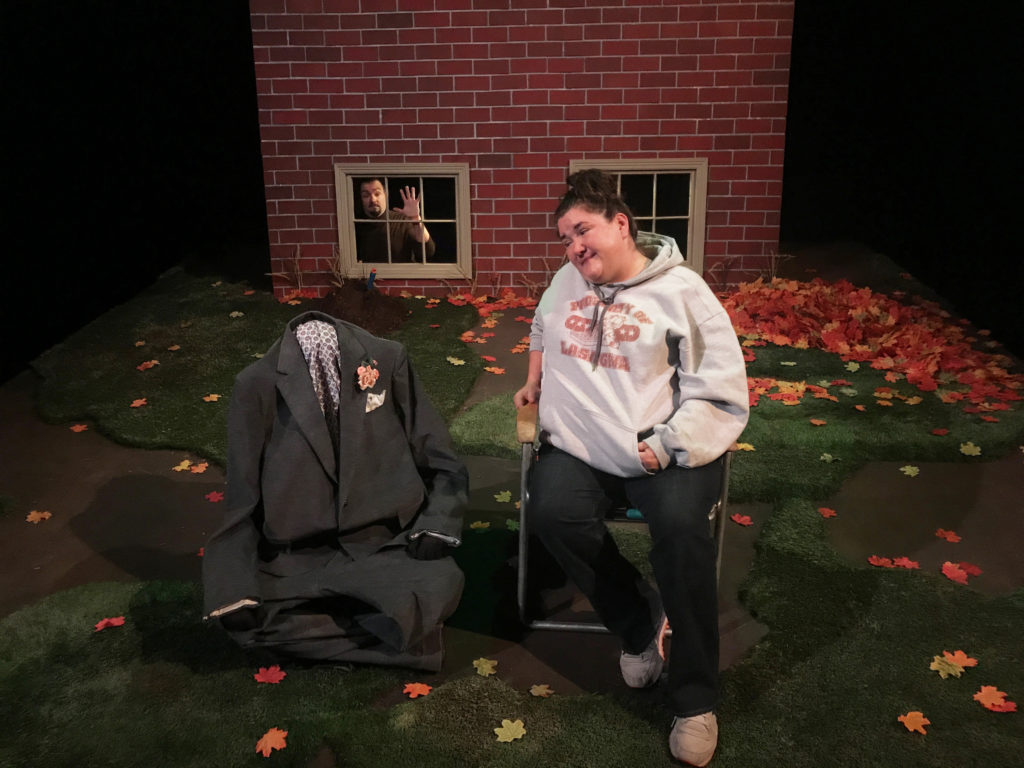Hannah Duggan, in an enveloping gray hoodie, and Brian Colonna, wearing very tight-fitting underpants, are about to bury a cat — her cat — while bickering bitterly. She’s loud and angry, he affects learned speech and a haughty demeanor. The cause of their argument: He bought a secondhand suit for the funeral; she says it’s not a funeral, they’re just burying her cat. Besides, the suit, which he’s already taken off and discarded on a pile of autumn leaves, looked stupid. According to the program for Edgar Allan Poe Is Dead and So Is My Cat, Colonna is playing “That One Guy” and Duggan “His Sister.” The other characters listed are Erik Edborg as “His Best Friend” and Erin Rollman as “Burt.”
Most of the people in the crowded, cheerful opening-night audience doubtless knew that the members of Buntport Theater have been presenting their astonishing work for over sixteen years, and that all of the productions are created by these four actors and a fifth, non-acting company member, SamAntha Schmitz. The scripts are original, powered by the artists’ obsessions, idiosyncrasies and talents, as well as whatever nugget of peculiar information has lodged recently in someone’s mind.
During the first few minutes of Edgar Allan Poe, with Duggan yelling and Colonna poncing around, though, I couldn’t help wondering if maybe this time the group, normally so reliably brilliant, had come a cropper with this show. Maybe it was going to be just plain silly. And as it turned out, that’s the goal. As the program explains, the actors “just want to laugh right now. We want something that occupies us for ninety minutes in a silly fantasy. We hope you want that, too.” Of course we do. We need a laugh as our president and his puppet Congress threaten to destroy everything we care about, hammer blow by hammer blow, from education to medicine, art to justice, democracy to the very world we live in.
But Edgar Allan Poe isn’t just silly; it’s Buntport-style silly. Which means silly in the inspired, nonsensical vein of Edward Lear, creator of “The Yonghy Bonghy Bo” and “The Dong With the Luminous Nose.” Is it disgusting that butterflies taste with their feet? His Best Friend wants to know. Whenever food is mentioned, That One Guy springs to the defense of Boston Market chicken, so unjustly and universally defamed. And later, there’s a discussion of margarine, that nasty industrial stuff that mid-twentieth-century women were persuaded to buy as more nutritious than butter. Under pressure from the dairy industry, manufacturers weren’t allowed to color their product, so little packages of yellow dye came with the unappetizing white blocks. As I listened, I remember thinking that the margarine riff served as a metaphor, encapsulating something important. But by the time I left the theater, I was so dizzy with laughter I’d forgotten what.
Despite the cast’s best intentions, there are moments that do suggest a deeper meaning beneath the arguments spiraling around in circles like peel stripped from an apple. Buntporters are always thinking about art — what it is, how it’s made. In Edgar Allan Poe, someone delivering a soliloquy stops to remark on the uses of soliloquy. “We are discussing metamorphosis,” another character says grandly, while heaving away a garbage bag. The reason That One Guy bought a secondhand suit was that Poe, to whom he devotes a worshipful podcast, wore another man’s suit to a funeral — but since he’s purchased the suit, it’s no longer another man’s, His Sister argues. Of course, there are references to Poe’s “The Raven” and his essay “The Philosophy of Composition.”
Every element — sound, visuals, costumes, lights, the use of space — is brought together in service to the company’s vision (whatever the hell that is). The set is a leaf-strewn garden fronting a conventional-looking house that the performers have to scramble in and out of since it has no doors. Each actor has a distinctive presence, and they balance each other perfectly: Edborg’s dopey friend, Colonna, trying for the gravitas of a genuine literary critic; Duggan’s hotly passionate disaffection. As for Erin Rollman — you’ll have to see what she does for yourself.
This show is a nod to the spooky season, complete with candles, fog machines and sinister music, as well as an homage to Poe, a release from political anxiety and an assertion of the liberating power of unadulterated silliness. And that’s more than enough.
-Juliet Wittman, October 31st, 2017 Westword
